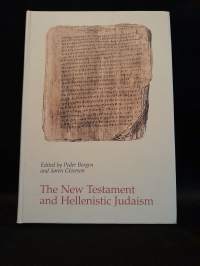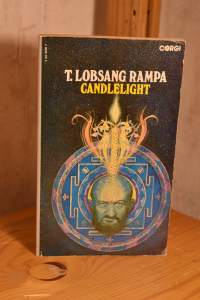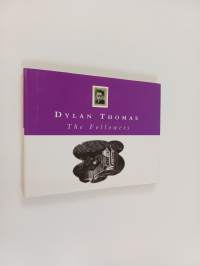Hakutulokset (10)

The New Testament and Hellenistic Judaism
Tyyppi:
Kirjat
Kunto:
K4 (Erinomainen)
Saatavilla:
1
Nidonta:
Kuvitettu kovakantinen

SUM - Tales From the Afterlives
Tyyppi:
Kirjat
Kunto:
K3 (Hyvä)
Saatavilla:
1
Nidonta:
Nidottu (pehmeäk.)

Analog Science Fiction/Science Fact: Vol XCVIII, No. 2 (Helmikuu 1978)
Tyyppi:
Kirjat
Kunto:
K3 (Hyvä)
Myyjä:
Saatavilla:
1
Nidonta:
Nidottu (pehmeäk.)

Candlelight
Rampa, Lobsang T., Corgi Books, 1974
Most of the letters T. Lobsang Rampa receives are full of questions about all aspects of metaphysics - pendulums, dowsing, how to levitate, teleport, and "remote view," etc.In "Candlelight," Dr. Rampa answers all of these questions and more, replying to queries about God, good versus evil, acupuncture, the media, and how to manage one's everyday affairs.This is Dr. Rampa's fourteenth book. Like its predecessors, "Candlight" brings "illumination to some, hope to others" - in particular, to his many students and followers all over the world.Hakusanat: tiibet, tibet, munkki, lobsang rampa, kolmas silmä, meditaatio, reinkarnaatio, jälleensyntymä
Hinta: 10,00 €
Lisää ostoskoriin
Lisää ostoskoriin
(Korissa 0 kpl)
(Korissa 0 kpl)
Kaikki tuotteet
Korissa (0)
Korissa (0)
Tyyppi:
Kirjat
Kunto:
K3 (Hyvä)
Saatavilla:
1
Nidonta:
Nidottu (pehmeäk.)

The Follower
Quentin Patrick, Penguin Books, 1955
Suomennettu nimellä Takaa-ajaja. Nuori aviomies palaa yllättäen kotiinsa ja löytää vain vaimonsa entisen poikaystävän murhattuna lattialla.
Hinta: 7,00 €
Lisää ostoskoriin
Lisää ostoskoriin
(Korissa 0 kpl)
(Korissa 0 kpl)
Kaikki tuotteet
Korissa (0)
Korissa (0)
Tyyppi:
Kirjat
Kunto:
K3 (Hyvä)
Myyjä:
Saatavilla:
1
Nidonta:
Nidottu (pehmeäk.)

Takaa-ajaja
Quentin Patrick, Book Studio, 1990
Muu(t) tekijä(t): Pertti KoskelaSarja: Jännityksen mestarit 48Alkuteos: The follower
Hinta: 4,00 €
Lisää ostoskoriin
Lisää ostoskoriin
(Korissa 0 kpl)
(Korissa 0 kpl)
Kaikki tuotteet
Korissa (0)
Korissa (0)

Takaa-ajaja
Quentin Patrick, Book Studio, 1990
Muu(t) tekijä(t): Pertti KoskelaSarja: Jännityksen mestarit 48Alkuteos: The follower
Hinta: 4,00 €
Lisää ostoskoriin
Lisää ostoskoriin
(Korissa 0 kpl)
(Korissa 0 kpl)
Kaikki tuotteet
Korissa (0)
Korissa (0)
Tyyppi:
Kirjat
Kunto:
K2 (Tyydyttävä)
Myyjä:
Saatavilla:
1
Nidonta:
Nidottu (pehmeäk.)

Takaa-ajaja
Quentin Patrick, Book Studio, 1990
Muu(t) tekijä(t): Pertti KoskelaSarja: Jännityksen mestarit 48Alkuteos: The follower
Hinta: 4,00 €
Lisää ostoskoriin
Lisää ostoskoriin
(Korissa 0 kpl)
(Korissa 0 kpl)
Kaikki tuotteet
Korissa (0)
Korissa (0)

Takaa-ajaja
Quentin Patrick, Book Studio, 1990
Muu(t) tekijä(t): Pertti KoskelaSarja: Jännityksen mestarit 48Alkuteos: The follower
Hinta: 4,00 €
Lisää ostoskoriin
Lisää ostoskoriin
(Korissa 0 kpl)
(Korissa 0 kpl)
Kaikki tuotteet
Korissa (0)
Korissa (0)

The Followers
Dylan Thomas, Weidenfeld & Nicolson, 1994
Hinta: 6,00 €
Lisää ostoskoriin
Lisää ostoskoriin
(Korissa 0 kpl)
(Korissa 0 kpl)
Kaikki tuotteet
Korissa (0)
Korissa (0)
Tyyppi:
Kirjat
Kunto:
K3 (Hyvä)
Myyjä:
Saatavilla:
1
Nidonta:
Sidottu (kansipaperit)




